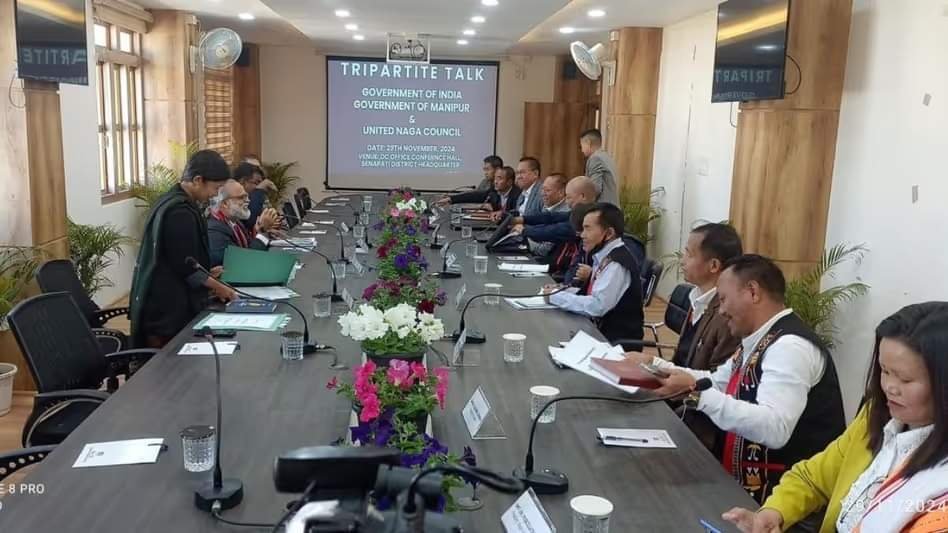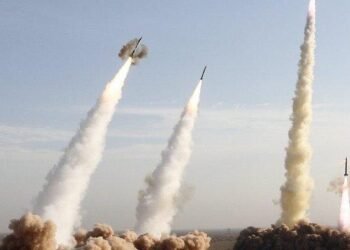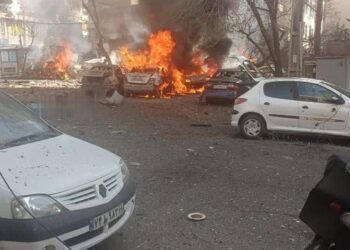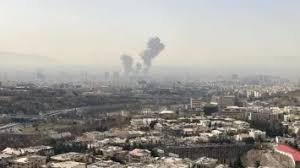The United Naga Council remains opposed to Manipur’s 2016 district reorganization, calling it a threat to Naga autonomy. Despite resumed talks, no breakthrough has been achieved, with discussions set to continue in January 2025.
BY PC Bureau
The latest round of tripartite talks among the Government of India, the Manipur state government, and the United Naga Council (UNC) over the creation of new districts in Manipur ended without resolution on Friday. The meeting, held at Senapati district headquarters, was the second since talks resumed in October 2024 after a long hiatus.
Discussions focused on the UNC’s long-standing demand to roll back the creation of seven new districts, a move made by the Manipur government through a December 8, 2016 notification (No.16/20/2016-R).
The UNC, opposing the decision, had previously launched various agitations, including a 139-day economic blockade on national highways. The blockade was lifted after the Centre’s intervention and the first round of tripartite talks in March 2017, though subsequent discussions have failed to yield a breakthrough.
Friday’s meeting saw the Central delegation led by A.K. Mishra, Advisor (Northeast) from the Ministry of Home Affairs, while the Manipur government was represented by Home Commissioner N. Ashok Kumar. The UNC delegation included its president Ng Lorho, general secretary Vareiyo Shatsang, Naga Women Union president Priscilla Thiumai, and ANSAM president Luikang Luckson.
Sources revealed that the Manipur government’s delegation cited challenges preventing the presentation of a concrete proposal, prompting objections from the UNC, which insisted on a detailed proposal in the next meeting. Despite the stalemate, all parties agreed to work towards a political resolution within a time-bound framework and adhere to prior commitments.
The next round of talks is scheduled for the last week of January 2025 at the same venue in Senapati district headquarters.
The UNC opposes the creation of seven new districts in Manipur primarily because it believes the move undermines the rights and interests of the Naga people. Here are the key reasons behind their opposition:
1. Perceived Encroachment on Naga Ancestral Land
The UNC claims that the creation of the new districts—especially those like Jiribam, Kangpokpi (renamed from Sadar Hills), and Tengnoupal—has been done without consulting the Naga tribal communities. They argue that these districts carve out territories historically belonging to the Nagas, diluting their control over ancestral lands.
2. Political and Administrative Fragmentation
The UNC sees the creation of new districts as an attempt to fragment Naga-dominated areas and weaken their political unity. They believe the move aims to undermine the Naga people’s long-standing demand for greater autonomy and self-governance under the framework of the Naga peace process.
3. Lack of Consultation
The state government’s unilateral decision to create the districts in 2016, without consulting the Naga tribal organizations or taking into account their concerns, is viewed by the UNC as a violation of democratic principles. This has fueled feelings of mistrust and alienation among the Naga community.
4. Economic and Cultural Impact
The UNC argues that the division of territories will disrupt traditional administrative and cultural structures, marginalizing the Naga people in their own land. They also fear it will affect economic resources and governance in Naga-dominated areas.
5. Impact on Ongoing Naga Peace Talks
The creation of new districts is seen as contrary to the spirit of the ongoing Naga peace process with the Government of India. The UNC believes it could complicate negotiations and weaken the Naga people’s position in seeking greater rights and recognition.
6. Symbol of Political Marginalization
The decision is perceived as an attempt by the Manipur government to assert control over areas with significant Naga populations, reducing the influence of tribal bodies like the UNC and eroding their autonomy.
In summary, the opposition stems from concerns about loss of land, political fragmentation, cultural erosion, and a perceived disregard for the Naga people’s aspirations and rights. These issues remain a significant source of tension between the UNC, the Manipur government, and the Centre.












